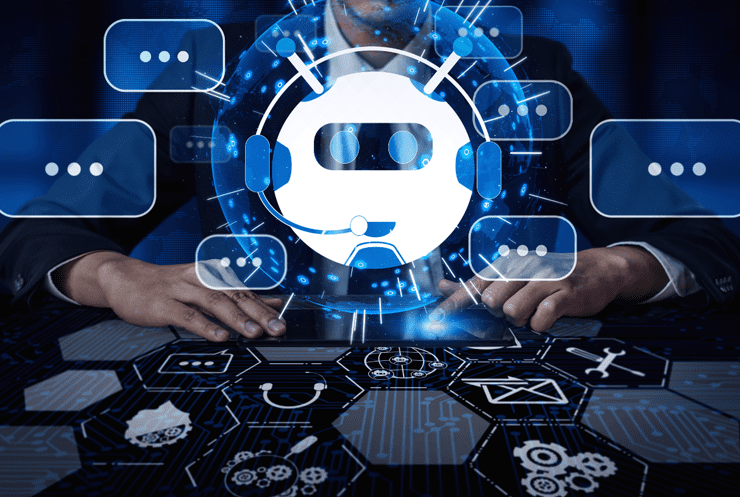Last Updated on March 9, 2023 by Dr Sharon Baisil MD
Can you believe that this article is entirely written using Artificial Intelligence, with an AI writing tool called Scalenut?
Welcome to the future 🙂 Click here to try the Scalenut tool for free
Artificial Intelligence (AI) refers to machines carrying out tasks to simulate human intelligence. It attempts to make computer technology capable of performing the same mental functions as humans, like reasoning, understanding language, and generalizing knowledge to new situations. Artificial Intelligence tools are already used for diagnostic support, clinical decision support, treatment, etc.
The third wave of AI is aimed at changing everyday human activities. We are moving from intelligent agents to intelligent assistants. Intelligent agents are autonomous software systems that solve tasks independently without user intervention. The classic example would be using a web browser to automatically purchase movie tickets based on our preferences and current location. In contrast, an intelligent assistant is a more interactive system that can communicate with the user and collaborate to perform certain tasks. A good example would be a personal health assistant created by IBM’s Watson. It assists users in creating healthy lifestyle plans based on their medical records and questions about their daily activities or food habits.
Here’s a rundown of AI-powered technologies that may revolutionize healthcare in 2023 and beyond.
Natural Language Processing (NLP)
Natural Language Processing is the ability of machines to understand human language. It is an area of AI that has seen tremendous growth in the last few years. NLP systems can understand text input, analyze it concerning context and meaning, and generate readable sentences for humans. The most important characteristic of NLP technologies is their ability to process unstructured and semi-structured data. This is quite crucial as most health information available on the internet is unstructured.
IBM Watson uses the Natural Language Processing (NLP) system to become an intelligent assistant who can perform different tasks by understanding human language. NLP systems analyze, understand, and derive meaning from human language. In the medical domain, NLP can be used as a powerful tool for analyzing written text related to medical knowledge, i.e., articles, patient transcripts, etc., and extracting information from it. This information could be useful to physicians to make better decisions about a specific disease or provide health care to a patient.
Deep Learning Algorithms

AI algorithms such as deep learning and neural networks can build predictive models for decision-making. Deep learning uses artificial neural networks with multiple hidden layers for modeling and pattern recognition. A standard feedforward multilayer perception (MLP) network gets the input, processes it, and finally outputs the result, i.e., it takes an input image, recognizes it, and finally outputs whether this is a cat or dog. A deep learning network does the same, but instead of simple perceptrons in the hidden layers, these networks use multiple layers (hidden) which can learn hierarchical representations of data like that found in images (e.g., edges first, then circles, then whiskers, and then a cat).
These systems can analyze medical images and provide specific diagnoses, which might otherwise require a team of radiologists. An example is Google Deepmind’s project, which automatically analyzes the retinal eye images from the hospitals and makes a proper diagnosis on diabetic retinopathy with 90% accuracy, suggests possible treatments, and provides a prognosis. Such systems can greatly impact the medical field in terms of accuracy and speed of diagnosis, saving precious time for doctors and minimizing unnecessary treatments.
AI-based chatbot systems can act as automated conversational agents, promoting health, providing education, and potentially prompting behavior change.
In the past few years, deep learning algorithms have been used for difficult tasks for traditional machine learning systems like image recognition and NLP analysis. Deep learning models use a cascade of multiple layers, and each layer takes an input and transforms it in some way to produce the output.
Sentiment Analysis
Sentiment analysis is the process of determining whether a piece of writing has a positive or negative connotation. This understanding can assess public opinion about certain health conditions, drugs, treatments, etc. Sentiment affects how people feel, think and act. As social media posts are publically available on various platforms like Facebook or Twitter, sentiment analysis can understand what the public feels about certain conditions or treatments.
This information can help physicians better understand patients’ opinions and accordingly take decisions to treat a condition in its best possible way, which might not otherwise be expressed in the medical literature. For example, it will enable doctors to decide whether to focus more on improving bowel screening rates or encouraging patients to quit smoking. Thus, sentiment analysis can help physicians make better and evidence-based decisions, and this trend will continue to increase as more and more people use social media platforms daily.
Artificial Intelligence-based chatbots

Chatbots can answer patients’ queries and give them information about conditions and treatments. Chatbots also provide emotional support, and at times, simply listening to people is enough to help them overcome some of the side effects of a treatment or condition.
Patients can ask questions and receive answers using conversational interfaces with chatbots. Such assistants can guide them about the treatment options and expected results simply and concisely. Chatbots could be integrated into different social media platforms, which would help patients to share their experiences on specific diseases or treatments with each other.
The use of NLP tools in chatbots can help physicians understand what patients are thinking about their treatments and how they feel to provide them with better care. Currently, there is a lack of integrated chatbots that can provide health education without physical support from medical professionals.
AI tools for clinical decision making
The research in AI is currently being used to develop software that can process large quantities of medical data and help physicians make better diagnosis and treatment decisions.
This software can detect patterns in data and use them to predict possible future outcomes. By training the system on data sets of past patient cases, researchers can develop systems that can help predict conditions before they manifest. This will allow physicians to provide better care for their patients by starting treatment earlier, thus preventing or delaying the onset of significant health problems. For example, a system can be trained to see a correlation between a decrease in lung function and the onset of lung cancer. This can help doctors save lives by catching problems before they become too difficult to treat.
Use of AI in medical writing
Currently, there are many medical studies published every day, but the lack of standardization in their reporting makes it tough for doctors to manage. Research writing is one of the most difficult and time-consuming procedures among the medical fraternity. AI algorithms can help doctors create structured reports, which will require tedious checking and time-consuming tasks. AI can analyze data from clinical trials, clinical protocols, patient cases, etc., which would help medical writers create structured content that would save an immense amount of time and resources.
By using AI algorithms, health care professionals can accurately create thousands of patient case reports, clinical trials, and other documentation, which would help them improve the quality of their services.
AI in research
NLP tools like Scalenut AI can help researchers, academics, and students to write better papers, which would require less time out of them. With the help of AI tools, medical researchers can parse through the huge amount of information available on the internet and use it to write papers with minimal effort.
AI algorithms can also help medical writers and researchers to create compelling stories by using data from scientific studies and research papers. This would improve the readability of documents and increase the chances of a paper being published.
AI systems can take the information from thousands of research papers and present it in a way that is easy to digest. This can help health care professionals develop interesting insights, which would allow them to discover new possible treatments for diseases. This would eventually lead to better treatment methods for patients.
Final Words
Artificial intelligence will have a significant impact on the health care industry. The applications are tremendous, and they will only grow in importance over time. AI algorithms can be used for simple tasks like authoring structured content by retrieving information from various documents with minor modifications to more complex things such as clinical protocols or reports that would take weeks instead of hours because they require higher levels of scientific interpretation. To conclude, artificial intelligence has immense potential and will be the next big thing in 2023.
Acknowledgment: As mentioned in the introduction, this article is entirely generated using an AI writing tool called Scalenut.
Click here to try the Scalenut tool for free

Hi, I am a doctor by profession, but I love writing and publishing ebooks. I have self-published 3 ebooks which have sold over 100,000 copies. I am featured in Healthline, Entrepreneur, and in the Massachusetts Institute of Technology blog.
Whether you’re a busy professional or an aspiring author with a day job, there’s no time like now to start publishing your ebook! If you are new to this world or if you are seeking help because your book isn’t selling as well as it should be – don’t worry! You can find here resources, tips, and tricks on what works best and what doesn’t work at all.
In this blog, I will help you to pick up the right tools and resources to make your ebook a best seller.

